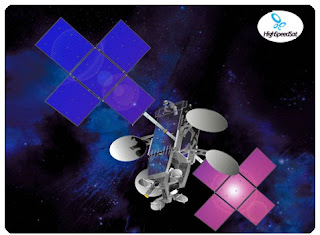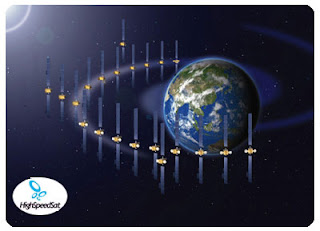ViaSat gambles on future of broadband satellite
ViaSat gambles on future of broadband satellite, hoping to draw rural customers with no access to high-speed Internet service. It's been 16 months since ViaSat Chief Executive Mark Dankberg unveiled plans to build a $400 million broadband satellite – calling it the biggest growth opportunity the Carlsbad company might ever see. And it's been 16 months since the company's shares tanked, falling 29 percent the week after the announcement.
Building its own satellite is a swing-for-the-fences strategy that could transform the company but could also strike out. Today, ViaSat has invested $100 million and counting toward the satellite, which is under construction at Space Systems/Loral in the Bay Area. It's on schedule to launch in about 20 months. ViaSat's effort to build its own satellite rests on a theory that is somewhat unproved: Are millions of rural households outside the reach of cable or DSL willing to pay the monthly fee and installation costs for high-speed Internet service via satellite? The answer is not as obvious as it might seem in the Digital Age. Current satellite-based Internet providers have less than 1 percent of the market share of total broadband subscribers in the United States.
When the Pew Internet and American Life Project asked households in 2007 and 2008 why they hadn't signed up for high-speed Internet, more than half said they didn't see the point. Price was the second-largest factor for not subscribing. The Obama administration, however, definitely thinks there's a need. The economic stimulus package includes $7.2 billion to give all Americans high-speed Internet access – especially those in rural areas where cable or DSL isn't available. That's why ViaSat and the satellite industry have become more vocal recently in touting their broadband programs. They want to make sure that satellite has a seat at the table with all the other technologies competing for stimulus funds.

The monthly cost for satellite broadband isn't much higher than for cable or DSL. It's more the upfront costs. Upfront fees vary, and specials can lower them. But to get satellite broadband service, households need a dish and modem installed. While the equipment can be purchased or leased, upfront costs and installation often range from $200 to $600.
Although ViaSat's satellite is nearly two years from launch, the company hopes that ViaSat 1 will benefit from federal programs encouraging expanded broadband access. ViaSat 1will be a new generation of satellite aiming to have a tenfold increase in the broadband capacity compared with existing satellites from competitors WildBlue Communications and Hughes. That translates into faster service for customers. ViaSat1 is proposed at 100 gigabits per second total capacity. It promises to deliver download speeds to Internet subscribers of between 2 megabits to 10 megabits per second.

WildBlue and Hughes, the largest companies offering satellite Internet service in the United States, each has about 10 gigabits of capacity. Existing satellite plans offer download speeds of 512 kilobits to 1.5 megabits per second for basic service. Faster speeds are available, but the monthly fees are well over $100. Viasat is proposing to provide just a lot more bandwidth than either of the established services, that's everything in a nutshell about what the differences are. While some Wall Street analysts see promise in ViaSat's satellite venture, it's an expensive gamble. There could be technical delays, which can quickly jolt costs skyward. Moreover, the satellite industry is littered with epic money-burning failures. And it takes years to build a satellite – leaving room for competing technologies such as WiMax or fourth-generation cellular networks to gain a foothold in rural markets. But perhaps the biggest risk is whether demand really exists for high-speed Internet outside of regions covered by DSL and cable at proposed prices. Analysts estimate that 10 million to 15 million households in the United States don't have access to broadband through cable or DSL. Existing satellite Internet providers combined have only 875,000 subscribers out of the 106 million households with broadband. There's certainly not a large percentage (of the population) in US that can't be reached by cable or DSL. Satellite has been available to fill that gap, but the problem has been the pricing has not been attractive. They haven't really established a huge user base.
Basically the market is constrained. It seems WildBlue does not have much capacity left in high-demand areas. Neither does Hughes. One question is how big would the market be if you went in with 10 times the bandwidth those guys have? ViaSat believes that it would be much bigger – particularly if it can offer high speeds at roughly the same costs. It expects retail prices for the service will cost about $50 a month for a basic plan, which is competitive with existing broadband services today. The company does not want to sell directly to consumers. It plans to be a wholesale provider of bandwidth to Internet service providers, or ISPs. WildBlue could be a potential ISP partner. So could rural telephone companies and satellite TV providers.
Founded in 1986, ViaSat spun out of San Diego wireless pioneer Linkabit. Its bread-and-butter business is making complex communications equipment for the military, such as modems that fit in the nose cones of fighter jets to allow pilots to see data from the battlefield.
Labels: highspeed satellite internet access, hughes, megabits, satellite ISP, viasat, visat-1 satellite, wildblue






















